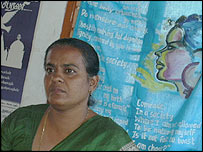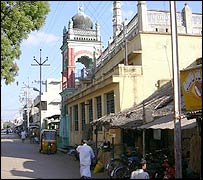
Daud Sharifa is spearheading the drive for the women's mosque
|
Daud Sharifa is meeting a group of distressed Muslim women - business as usual at her red-brick office in sleepy Pudukkottai, in India's southern state of Tamil Nadu.
The shy women tell in low voices stories of how they have been divorced, abandoned and mistreated by their husbands.
Sharifa, a 39-year-old single woman who runs a 3,000-strong network to help Muslim women, gives advice.
The audience listens to her impassioned plea for women to build their own place of worship and be involved in community rulings on marriage, divorce, domestic abuse and child custody.
"Would having a place of worship of your own help? Would a jamat [community elders at mosques who adjudicate on family matters] of women be more sympathetic to your cause?" asks Sharifa.
The women nod in unison.
Rising complaints
Sharifa, an unlikely feminist in India's traditionally male-dominated southern heartland, has caused a storm by leading the movement for the women's mosque.

Some women complain rulings in mosques are biased against them
|
"We want our space to meet, talk, discuss our grievances and pray. We want to have a say in community rulings," Sharifa told BBC News Online.
In India, Muslim women mostly pray in buildings adjoining mosques; in some big mosques there are separate prayer enclosures.
"The majority of mosques do not allow women to pray," says Badar Sayed, a Chennai-based lawyer and chairwoman of Tamil Nadu's Waqf Board.
Waqf boards are elected bodies of Muslim theologians.
Ms Sayed says it is extremely important for women to be a part of a mosque congregation.
"Sometimes the sermons relate to women. Women should be present, listening in and finding out what they are all about," she says.

Female worshippers must often pray in adjacent buildings
|
Sharifa says the idea of a women's mosque was motivated by the rising number of complaints from local Muslim women against what they see as partisan rulings by the jamat.
Last year, she received over 100 petitions from women against jamat rulings in matters of dowry, divorce and domestic violence.
"The mosque will be a symbol of our awakening. Men are welcome to come and pray, but women will manage the affairs and be on its jamat," says Sharifa.
Badar Sayed agrees that the "male-dominated jamats" are often biased in rulings that affect women.
"Women are oppressed. The jamat does rule against them most of the time," she says.
"Men are sitting in judgment. Jamats should accept women into their fold."
Compromise
But Mohammed Sikkandar, secretary of Chennai's Purasawalkam mosque, says the jamats are "by and large fair".
"In matters of family dispute, we take our decision after talking to the affected women. Nothing is hastily decided," he says.
Mr Sikkandar says that of the 40 family dispute cases that came to his mosque in the past year, all but five were settled with a compromise.
 |
 Our mosque will help us to get together and vent our feelings
Our mosque will help us to get together and vent our feelings

|
He says jamats have even given away hefty compensation packages to women, citing the example of a 400,000-rupee ($8,800) award his jamat paid to a woman divorcing her abusive husband.
But this does not deter Sharifa, who says that there "might be a few good men, and a few good jamats", but the system is stacked against women.
She has toured villages and towns, collecting 9,000 rupees ($200) towards building the mosque. She will need $55,000.
Rashida Begum, a 21-year-old teacher and divorcee, is one of the Pudukkottai women supporting her.
"We are confined to our homes. Our thoughts are pent up. Our mosque will help us to get together and vent our feelings," Ms Begum says.
Rajitha Begum, 37, whose husband abandoned her, says a mosque would help women who have "nobody to go to".
